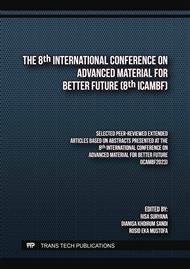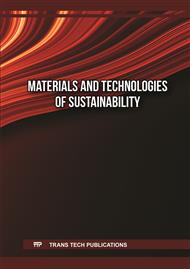[1]
W. Strielkowski, E. Tarkhanova, M. Tvaronaviˇ, and Y. Petrenko, "Renewable Energy in the Sustainable Development of Electrical," vol. 14, no. 24, p.1–24, 2021.
Google Scholar
[2]
M. Farangi, E. Asl Soleimani, M. Zahedifar, O. Amiri, and J. Poursafar, "The Environmental and Economic Analysis of Grid-Connected Photovoltaic Power Systems with Silicon Solar Panels, in Accord with The New Energy Policy in Iran," Energy, vol. 202, no. 2020, p.1–13, 2020.
DOI: 10.1016/j.energy.2020.117771
Google Scholar
[3]
H. Tian and L. Sun, Organic Photovoltaics and Dye-Sensitized Solar Cells, vol. 8. Elsevier Ltd., 2013.
DOI: 10.1016/B978-0-08-097774-4.00809-3
Google Scholar
[4]
M.-E. Yeoh and K.-Y. Chan, "A Review on Semitransparent Solar Cells for Agricultural Application," IEEE J. Photovoltaics, vol. 11, no. 2, p.354–361, 2021.
DOI: 10.1016/j.mtener.2021.100852
Google Scholar
[5]
K. Salgado-Castro, I. V. Lijanova, D. Jaramillo-Vigueras, and J. N. Castillo-Cervantes, "Effect of the TiO2 Anchoring of a Hydrophobic Ionic Liquid in a Fully Aqueous DSSC," IEEE J. Photovoltaics, vol. 9, no. 6, p.1708–1715, 2019.
DOI: 10.1109/JPHOTOV.2019.2943619
Google Scholar
[6]
J. Ghnimi, Z. Kadachi, M. Ben Karoui, and R. Gharbi, "Performances Enhancement of Natural DSSC by Ga-Doped ZnO Layer Used in the FTO/TiO2/ZnG Photoanode," IEEE J. Photovoltaics, vol. 7, no. 6, p.1667–1673, 2017.
DOI: 10.1109/JPHOTOV.2017.2731940
Google Scholar
[7]
J. Gong, J. Liang, and K. Sumathy, "Review on dye-sensitized solar cells (DSSCs): Fundamental concepts and novel materials," Renew. Sustain. Energy Rev., vol. 16, no. 8, p.5848–5860, 2012.
DOI: 10.1016/j.rser.2012.04.044
Google Scholar
[8]
S. Chatterjee and I. B. Karki, "Effect of Photoanodes on the Performance of Dye-Sensitized Solar Cells," J. Inst. Eng., vol. 15, no. 3, p.62–68, 2020.
DOI: 10.3126/jie.v15i3.32008
Google Scholar
[9]
S. Raha and M. Ahmaruzzaman, "ZnO nanostructured materials and their potential applications: progress, challenges and perspectives," Nanoscale Adv., vol. 4, no. 8, p.1868–1925, 2022.
DOI: 10.1039/d1na00880c
Google Scholar
[10]
R. Rasmidi, M. Duinong, and F. P. Chee, "Radiation damage effects on zinc oxide (ZnO) based semiconductor devices– a review," Radiat. Phys. Chem., vol. 184, no. March, p.109455, 2021.
DOI: 10.1016/j.radphyschem.2021.109455
Google Scholar
[11]
S. Luo, R. Chen, L. Xiang, and J. Wang, "Hydrothermal Synthesis of (001) Facet Highly Exposed ZnO Plates: A New Insight into the Effect of Citrate," vol. 9, no. 11, p.1–12, 2019.
DOI: 10.3390/cryst9110552
Google Scholar
[12]
Z. Zhang, Z. Kang, Q. Liao, X. Zhang, and Y. Zhang, "One-dimensional ZnO nanostructure-based optoelectronics," Chinese Phys. B, vol. 26, no. 11, p.1–12, 2017.
DOI: 10.1088/1674-1056/26/11/118102
Google Scholar
[13]
M. M. Tavakoli, R. Tavakoli, Z. Nourbakhsh, A. Waleed, U. S. Virk, and Z. Fan, "High Efficiency and Stable Perovskite Solar Cell Using ZnO/rGO QDs as an Electron Transfer Layer," Adv. Mater. Interfaces, vol. 3, no. 11, p.1–10, 2016.
DOI: 10.1002/admi.201500790
Google Scholar
[14]
F. A. Jumeri, H. N. Lim, Z. Zainal, N. M. Huang, A. Pandikumar, and S. P. Lim, "Dual Functional Reduced Graphene Oxide as Photoanode and Counter Electrode in Dye-Sensitized Solar Cells and Its Exceptional Efficiency Enhancement," J. Power Sources, vol. 293, no. 2015, p.712–720, 2015.
DOI: 10.1016/j.jpowsour.2015.05.102
Google Scholar
[15]
K. Fujita, K. Murata, T. Nakazawa, and I. Kayama, "Crystal Shapes of Zinc Oxide Prepared By the Homogeneous Precipitation Method.," Yogyo Kyokai Shi/Journal Ceram. Soc. Japan, vol. 92, no. 4, p.227–230, 1984.
DOI: 10.2109/jcersj1950.92.1064_227
Google Scholar
[16]
W. Feng, B. Wang, P. Huang, X. Wang, J. Yu, and C. Wang, "Wet chemistry synthesis of ZnO crystals with hexamethylenetetramine(HMTA): Understanding the role of HMTA in the formation of ZnO crystals," Mater. Sci. Semicond. Process., vol. 41, p.462–469, 2016.
DOI: 10.1016/j.mssp.2015.10.017
Google Scholar
[17]
S. Xu and Z. L. Wang, "One-dimensional ZnO nanostructures: Solution growth and functional properties," Nano Res., vol. 4, no. 11, p.1013–1098, 2011.
DOI: 10.1007/s12274-011-0160-7
Google Scholar
[18]
V. Gerbreders et al., "Hydrothermal synthesis of ZnO nanostructures with controllable morphology change," CrystEngComm, vol. 22, no. 8, p.1346–1358, 2020.
DOI: 10.1039/c9ce01556f
Google Scholar
[19]
S. Maiti, S. Pal, and K. K. Chattopadhyay, "Recent advances in low temperature , solution nanoarchitectures for electron emission and," CrystEngComm, vol. 17, p.9264–9295, 2017.
DOI: 10.1039/c5ce01130b
Google Scholar
[20]
J. G. Strom and H. W. Jun, "Kinetics of hydrolysis of methenamine," J. Pharm. Sci., vol. 69, no. 11, p.1261–1263, 1980.
DOI: 10.1002/jps.2600691107
Google Scholar
[21]
K. Govender, D. S. Boyle, P. B. Kenway, and P. O'Brien, "Understanding the factors that govern the deposition and morphology of thin films of ZnO from aqueous solution?," J. Mater. Chem., vol. 14, no. 16, p.2575–2591, 2004.
DOI: 10.1039/b404784b
Google Scholar
[22]
M. M. J. Van Rijt, B. M. Oosterlaken, H. Friedrich, and G. De With, "Controlled titration-based ZnO formation," CrystEngComm, vol. 23, no. 18, p.3340–3348, 2021.
DOI: 10.1039/d1ce00222h
Google Scholar
[23]
S. Abubakar et al., "Controlled Growth of Semiconducting ZnO Nanorods for Piezoelectric Energy Harvesting-Based Nanogenerators," Nanomaterials, vol. 13, no. 6, p.1–32, 2023.
DOI: 10.3390/nano13061025
Google Scholar
[24]
T. E. P. Alves, C. Kolodziej, C. Burda, and A. Franco, "Effect of particle shape and size on the morphology and optical properties of zinc oxide synthesized by the polyol method," Mater. Des., vol. 146, p.125–133, 2018.
DOI: 10.1016/j.matdes.2018.03.013
Google Scholar
[25]
R. A. Rochman, S. Wahyuningsih, A. H. Ramelan, and Q. A. Hanif, "Preparation of nitrogen and sulphur Co-doped reduced graphene oxide (rGO-NS) using N and S heteroatom of thiourea," IOP Conf. Ser. Mater. Sci. Eng., vol. 509, no. 1, p.1–9, 2019.
DOI: 10.1088/1757-899X/509/1/012119
Google Scholar
[26]
J. Li et al., "Preparation of rGO/ZnO photoanodes and their DSSCs performance," Mater. Sci. Pol., vol. 40, no. 2, p.170–180, 2022.
DOI: 10.2478/msp-2022-0019
Google Scholar



